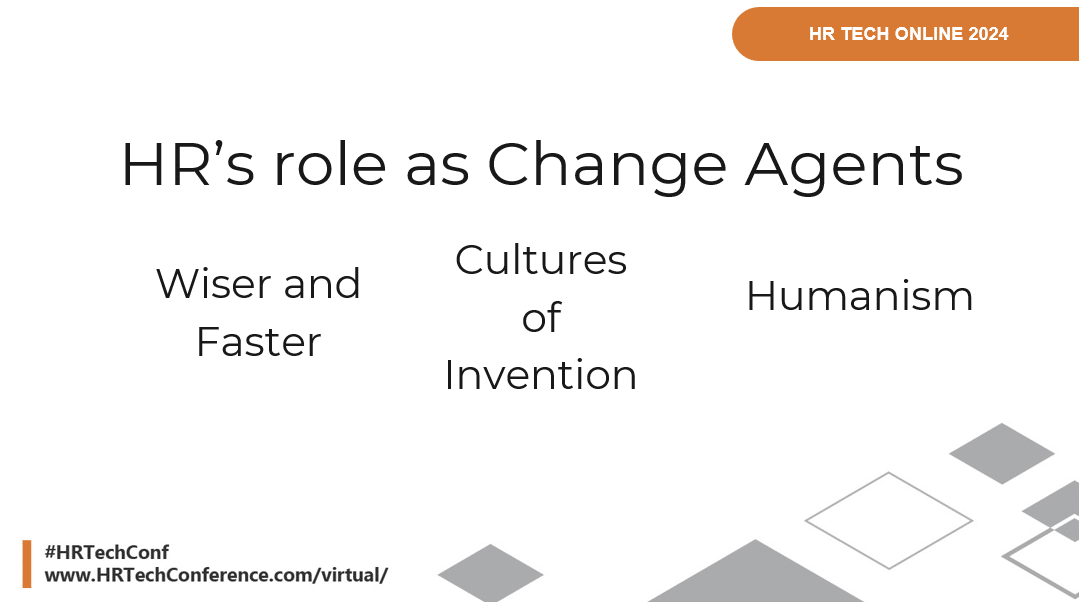Today’s complex organizational challenges require HR to be more agile, innovative and strategic than ever before. According to Gartner, 92% of HR leaders believe that their organizations cannot effectively compete in the talent market without having great leaders in place.
CHROs, in particular, must have the right skills and knowledge to navigate uncertainties and support business growth during a season of intense tech developments. According to Dr. Amy Dufrane, AI is pushing HR leaders to become change agents, learn new skills and ensure ethical tech use.
Dufrane, one of Human Resource Executive‘s Top 100 HR Tech Influencers this year, is CEO of the HR Certification Institute (HRCI) and Human Resource Standards Institute (HRSI), organizations that certify and educate human resource professionals worldwide. During a keynote session at HR Tech Online 2024, Dufrane told the audience how AI can enhance their roles through thoughtful use of these technologies.
Using new tech responsibly
Reflecting on her early days in business during the late ’80s and early ’90s, Dufrane recounted working in a personnel office where six employees shared a single computer. Today, the landscape has dramatically changed. “I ask you and challenge you to look around you,” said Dufrane. “What’s on your [desk] right now? I have a desktop, a laptop, two iPads, my phone and a Kindle.”

Dufrane says that using tech to solve problems makes sense, but tech utilization should be paired with a dose of skepticism. “When you’re skeptical of new tech, you use it responsibly and pragmatically,” she added.
But there is another side. According to Dufrane, it’s also good to be skeptical of doing things as they have always been done. “You need the courage to experiment with new things in the face of lots of uncertainty, which we all know there’s a lot of that,” she said.
It’s crucial for HR leaders to understand how AI impacts their business and to prepare their teams accordingly, said Dufrane. Artificial intelligence tools don’t have sentiment or consciousness—their power comes from their mathematical processes—so this tech requires human input to make meaning.
Dufrane reminded the audience that humans must pay close attention to AI-generated content, a crucial requirement to avoid potential issues that would violate employee privacy, data quality or ethics. Whether an organization develops these tools in-house or acquires them externally, it must ensure AI is used effectively and responsibly.

Opportunities for HR leaders
Dufrane says that HR leaders are change agents and contribute to organizational transformation, regardless of the industry. She believes HR should focus on fostering collaboration between humans and machines rather than viewing them as competitors, according to Dufrane.
She says it is challenging for AI to assess soft skills like work ethic, curiosity and cultural fit—human involvement is essential for understanding these more nuanced qualities. However, HR teams can leverage AI to improve efficiency in other areas, such as drafting employee guidelines and surveys, analyzing survey results and processing internal documents to ensure consistency.
The speaker said that HR leaders must guide their companies in understanding the broader impact of AI, including job upskilling, reskilling, retraining, job displacement and employee morale.
Dufrane emphasizes the importance of addressing fears related to AI. She also encourages organizations to anticipate potential consumer or societal harms, particularly for companies developing AI algorithms and tools.
Dufrane said the growing demand for prompt engineering skills presents an opportunity for HR leaders to equip their teams and workforce with this capability. By fostering an organization-wide appreciation for the potential benefits of AI—coupled with knowledge of how to harness it responsibly—companies can take advantage of the power of AI while proactively addressing potential downsides. “Every employee needs to know how to interact with a generative AI tool,” said Dufrane.
She said the best way to learn is by doing, especially in HR. “HR professionals need to understand AI concepts—not the math and not the code—but to contribute to those conversations about AI and how we could use them within our organizations.”
The post How new tech is challenging HR leaders to act as change agents appeared first on HR Executive.